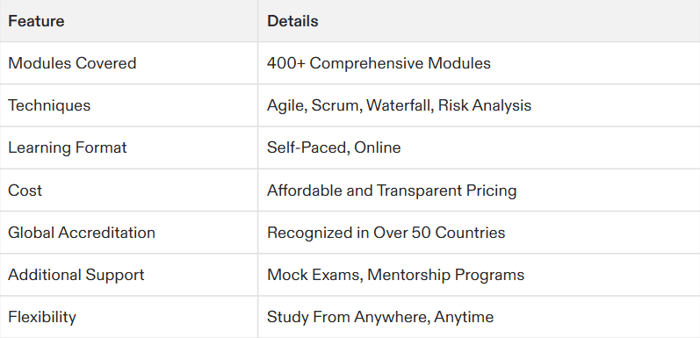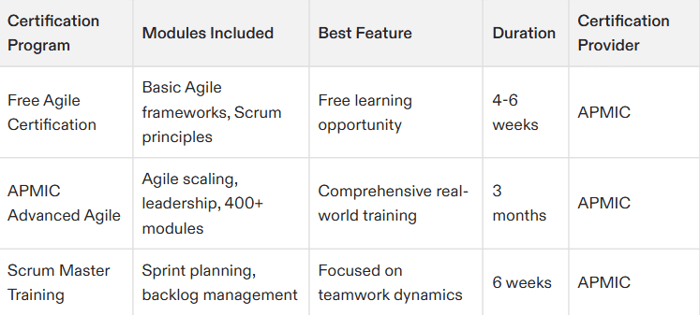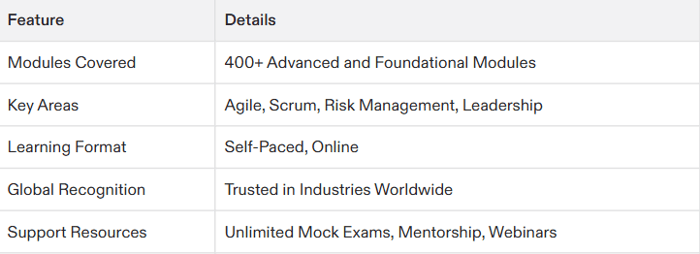Table of Contents
- What is the Project Management Certification Timeline?
- Why Planning Your Certification Timeline is Crucial
- The Key Phases of the Project Management Certification Timeline
- 1. Choosing the Right Certification (1–2 Weeks)
- 2. Meeting Eligibility Requirements (2–4 Weeks)
- 3. Application Process (1–3 Weeks)
- 4. Study and Preparation Period (2–6 Months)
- 5. Scheduling and Taking the Exam (2–4 Weeks)
- 6. Certification Approval and Recognition (1 Week)
- 7. Recertification Cycle (Every 3 Years)
- Final Thoughts: Take Control of Your Certification Journey
- FAQs
So you are ready to plunge into the realm of project management certifications? Well done! But before you start envisioning yourself boasting those nice initials like PMP or CAPM behind your name, there is one thing that needs to be said – this is not a Netflix marathon, this is a marathon. It is, therefore, important to have a plan, to work hard, and to have a timeline to guide one’s work. But don’t worry, we’ve got your back. This guide should therefore be considered as your GPS when navigating through the process of getting project management certifications. By the time you are through with this article, you will be in a position to achieve your goals and maybe even impress your boss or future boss. Let’s get started!
What is the Project Management Certification Timeline?
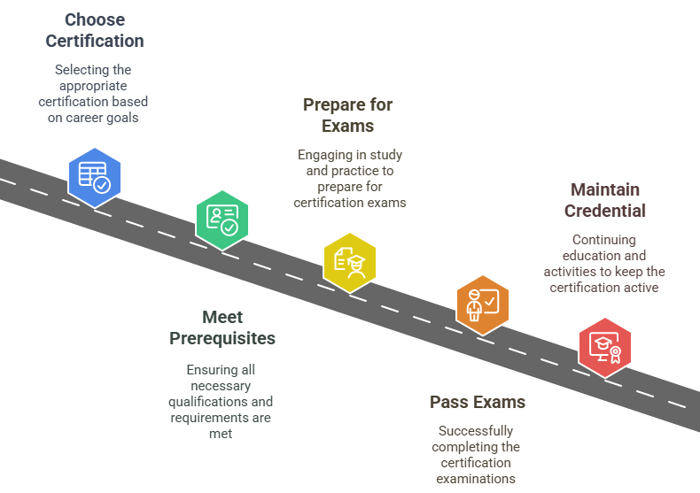
The Project Management Certification Timeline refers to the structured steps required to earn globally recognized credentials like PMP (Project Management Professional), CAPM (Certified Associate in Project Management), or PRINCE2. It includes everything from choosing the right certification to preparing for exams and maintaining your credential through recertification.
Each certification has its own prerequisites, preparation requirements, and milestones. Whether you’re a seasoned professional or a newbie, understanding this timeline ensures that you stay organized and avoid unnecessary delays.
One essential part of your preparation involves studying the right materials. For those looking to enhance their knowledge and boost their career prospects, you can check out Project Management Certification Books, which provide invaluable resources for exam preparation and overall mastery of project management principles.
Why Planning Your Certification Timeline is Crucial
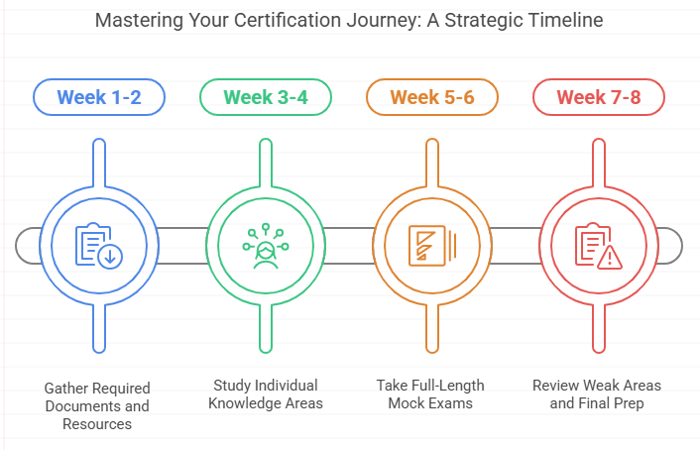
Let’s be honest: life in 2025 is busier than ever. Between work deadlines, family commitments, and scrolling through endless TikTok videos or binge-watching the latest hit series, finding time for professional development can feel like trying to juggle flaming swords. That’s why planning your certification timeline isn’t just important—it’s essential. Without a clear roadmap, you risk turning what should be an exciting career milestone into a stressful, drawn-out process.
But don’t worry; with a well-thought-out plan, you can tackle your certification journey like a pro. Here’s why planning your timeline is not just helpful but downright game-changing:
1. Efficiency: Work Smarter, Not Harder
Breaking down the certification process into smaller, manageable tasks ensures you stay on track without feeling overwhelmed. Imagine trying to cram for the PMP exam in a week—it’s like trying to eat an entire pizza in one bite (spoiler: it won’t end well). Instead, a structured timeline allows you to focus on one slice at a time, making the process more digestible and less intimidating.
For example:
Allocate specific weeks to study individual knowledge areas like risk management or stakeholder engagement.
Use tools like APMIC’s 400+ interactive modules to streamline your learning process and save time.
By dividing your preparation into chunks, you’ll not only retain information better but also avoid burnout—a common issue for professionals juggling work and studies.
If you’re looking for a detailed certification roadmap in your region, check out the Project Management Certification in Maryland for more insights on how to plan your certification journey effectively.
2. Time M anagement: Compress Months into Weeks
Certifications like PMP or CAPM typically take 3–6 months to complete, depending on your experience and schedule. However, with proper planning and the right resources, some candidates manage to fast-track their preparation in as little as 8 weeks!
How?
Set realistic goals: Dedicate 10–15 hours per week to studying if you’re aiming for an accelerated timeline.
Leverage technology: Use online platforms offering self-paced learning options that fit around your busy schedule.
Track progress: Regularly evaluate your readiness with practice exams to ensure you’re on target for success.
Remember, time is money—especially when certifications can lead to higher salaries and better job opportunities. Efficient time management ensures you reach your goals faster without sacrificing quality preparation.
3. Avoiding Delays: Stay Ahead of the Game
One of the biggest risks of not planning your certification timeline is falling behind schedule. Whether it’s missing application deadlines or underestimating study time, poor planning can derail your progress and even cost you extra fees for rescheduling exams or retaking them after failing.
Here’s how planning helps avoid delays:
Application Prep: Gather all required documents (e.g., academic transcripts, work experience records) well in advance to avoid last-minute scrambling.
Structured Study Plan: Create a weekly study calendar and stick to it religiously.
Built-in Buffers: Include extra time in your timeline for unexpected setbacks like work emergencies or personal obligations.
By staying organized and proactive, you’ll maintain momentum and keep stress levels low—even when life throws curveballs your way.
4. Enhanced Confidence: Know You’re Ready
Proper planning doesn’t just help with logistics; it also boosts your confidence going into the exam. Knowing you’ve covered all the material thoroughly and practiced extensively gives you peace of mind—and that can make all the difference on test day.
For instance:
Take full-length mock exams under timed conditions to simulate the real test environment.
Review weak areas identified during practice tests and allocate extra study time to strengthen them.
Use trusted resources like PMI’s PMBOK Guide or APMIC’s expertly designed modules to ensure comprehensive coverage of exam topics.
Confidence isn’t just about knowing the material; it’s about knowing you’ve done everything possible to prepare effectively.
5. Career Momentum: Don’t Miss Opportunities
In today’s fast-paced job market, timing is everything. Delaying your certification could mean missing out on promotions, salary hikes, or new job opportunities that require PMP or CAPM credentials.
For example:
Many companies prioritize PMP-certified candidates for leadership roles in project management.
Completing your certification quickly allows you to capitalize on emerging opportunities in growing industries like IT, healthcare, and construction.
By planning your timeline strategically, you position yourself as a competitive candidate ready to seize career advancements as soon as they arise.
The Key Phases of the Project Management Certification Timeline
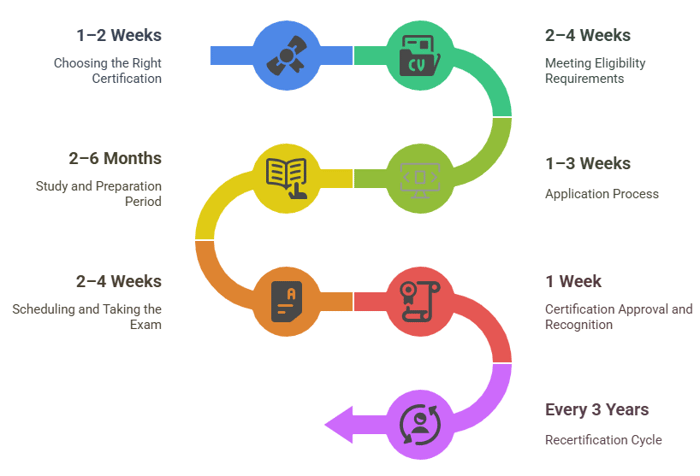
1. Choosing the Right Certification (1–2 Weeks)
Before jumping in, ask yourself: What are my career goals? Different certifications cater to different needs:
PMP (Project Management Professional): Perfect for experienced project managers looking to advance their careers.
CAPM (Certified Associate in Project Management): Great for beginners or those transitioning into project management roles.
PRINCE2 Practitioner: Ideal for professionals working in process-oriented environments.
Pro Tip: Use tools like PMI’s certification comparison page or career assessment resources to make an informed decision.
2. Meeting Eligibility Requirements (2–4 Weeks)
Each certification has specific prerequisites:
PMP Requirements
A 4-year degree
36 months of project leadership experience
35 hours of PM education (fulfilled through programs like APMIC)
CAPM Requirements
High school diploma
23 hours of PM education
During this phase, gather all necessary documents like academic transcripts and professional experience records to streamline your application process.
3. Application Process (1–3 Weeks)
Submitting your application is more than just filling out forms—it’s about showcasing your qualifications effectively. For PMP and CAPM certifications, applications are submitted via PMI’s online portal and reviewed within 5–10 business days.
Pro Tip: APMIC offers templates and guidance to ensure your application is error-free and processed quickly.
4. Study and Preparation Period (2–6 Months)
This is where the real work begins! Depending on your experience level and schedule flexibility, this phase can take anywhere from a few weeks to several months.
Tips for Effective Preparation:
Set a Study Plan: Break down topics into weekly modules focusing on knowledge areas like risk management or stakeholder engagement.
Use Reliable Resources: Opt for trusted materials like PMI’s PMBOK Guide or APMIC’s interactive 400+ modules.
Take Practice Tests: Mock exams help refine time management skills and identify weak areas.
5. Scheduling and Taking the Exam (2–4 Weeks)
Once you feel confident, schedule your exam at an authorized testing center or opt for an online proctored exam for added convenience.
Exam Details:
PMP Exam: 230 minutes, 180 questions covering people, processes, and business environments.
CAPM Exam: Approximately 3 hours with 150 questions.
6. Certification Approval and Recognition (1 Week)
After passing the exam, you’ll receive official certification status from PMI or another certifying body. Update your LinkedIn profile and resume—you’ve earned it!
7. Recertification Cycle (Every 3 Years)
Certifications like PMP require ongoing education to maintain their validity. For example:
Earn 60 PDUs (Professional Development Units) every three years.
APMIC offers tailored courses to help you meet these requirements seamlessly.
Final Thoughts: Take Control of Your Certification Journey
Earning a project management certification isn’t just about passing an exam—it’s about investing in yourself and unlocking new career opportunities. By following this timeline and leveraging expert resources like APMIC’s comprehensive prep program, you can achieve success faster and with less stress.
Ready to start your journey? Check out APMIC's PMP Certification Prep Course—the ultimate resource for mastering every step of the process!
FAQs
How long does it take to get PMP certified?
Most candidates complete their PMP certification within 3–8 months depending on their preparation schedule.
Can I fast-track my certification?
Yes! With structured programs like APMIC’s modules, some candidates achieve certification in as little as eight weeks.
What is the typical study time needed for CAPM?
CAPM candidates often need 8–12 weeks with 10–15 hours of study per week.
Is online training effective?
Absolutely! Online platforms offer flexibility and access to high-quality resources.
Do I need project management experience for CAPM?
No prior experience is required—just 23 hours of PM education.
What happens if I fail the exam?
You can retake PMP or CAPM exams up to three times within one year of eligibility.



